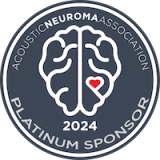Spotlight
Member of a National Network
Rush is a gold sponsor of the Acoustic Neuroma Association, the premier resource for the acoustic neuroma community that informs, educates and supports those affected by acoustic neuroma brain tumors.

As the only dedicated acoustic neuroma program in Chicago, Rush experts ensure you receive the most effective, advanced treatments.
Rush is a gold sponsor of the Acoustic Neuroma Association, the premier resource for the acoustic neuroma community that informs, educates and supports those affected by acoustic neuroma brain tumors.

An acoustic neuroma is a benign, often slow-growing tumor on one of the nerves that connects the brain and the inner ear. It's also known as a vestibular schwannoma.
As the tumor grows, it can start to push on the nerve and cause problems with your balance or hearing. You may feel dizzy or have tinnitus, a ringing sound in your ear.
If the tumor grows even larger, it can cause problems related to brain compression. Though this is rare, it can lead to confusion, headaches, vomiting or losing consciousness. Although it would be very rare for an acoustic neuroma to be fatal, the symptoms can greatly affect your quality of life.
Most acoustic neuromas appear spontaneously, meaning they have no known cause. The tumor is made of Schwann cells, which cover nerve fibers. It can either be unilateral, meaning it only affects one ear, or bilateral, meaning it affects both ears.
Unilateral acoustic neuromas are more common. Bilateral acoustic neuromas are rarer and are usually found in people with neurofibromatosis-2, a genetic condition that can lead to increased risk of developing tumors.
The Rush Acoustic Neuroma Program offers personal care plans for patients with acoustic neuromas. The program brings together highly skilled specialists who have extensive experience diagnosing and treating these tumors, including the following:
The team is committed to improving your quality of life by helping you make informed decisions about managing your tumor and, when needed, rehabilitation for hearing loss.
To diagnose an acoustic neuroma, the most important test is an MRI scan of the inner ear. This can detect even small tumors in very early stages. Other tests may include hearing or balance tests to measure nerve function.
There are three general approaches for managing acoustic neuromas. They include the following:
Your team of specialists will provide input and work with you to decide on the best approach for treatment. They’ll take the following into account:
It's important to consult with an acoustic neuroma specialist to learn about all your options before you start any type of treatment. Because our team offers every available treatment option for acoustic neuromas, we can help you get the appropriate treatment at the right time.
We encourage you to schedule a consultation with us:
Rush has acoustic neuroma doctors in downtown Chicago and Oak Brook.
 Meet our acoustic neuroma care providers
Meet our acoustic neuroma care providers
The first line of treatment for acoustic neuroma will vary based on your individual condition. But your care team will always work to recommend the least invasive approaches that will be effective. In some cases, this may only involve monitoring a tumor’s growth. Others will need surgery.
It is very rare for acoustic neuroma to cause death, so the life expectancy for someone with this kind of tumor is mostly unchanged. But it can greatly affect your quality of life, so it is best to seek treatment as soon as possible. Permanent hearing loss or nerve damage can occur.
Yes, a full recovery is possible after treatment. Your recovery and how long it takes will vary, but your care team will help you understand your condition and options. They can connect you with rehabilitation services for follow-up care if needed.
No, these types of tumors will not go away on their own. But because they can be small and slow-growing, some patients may only need observation instead of treatment. Your care team will advise you on the least invasive treatments possible.
No, even though an acoustic neuroma is a brain tumor, it does not directly cause psychiatric symptoms. But the symptoms you do experience can affect your quality of life and, in doing so, affect your mental well-being. That is one reason it is important to seek treatment as early as possible.

Elias Michaelides, MD, Section Head of Otology, Neurotology and Lateral Skull Base SurgeryFor our acoustic neuroma patients, we work in a collaborative fashion with the departments of neurosurgery and radiation oncology to offer you a full array of treatment options.
1611 W Harrison St
Orthopedic Building - Suite 550
Chicago, IL 60612
2011 York Rd
Oak Brook, IL 60523
9200 Calumet Ave, Suite E107
Munster, IN 46321